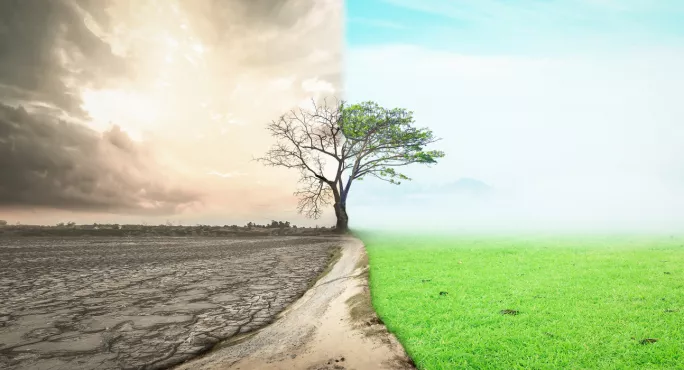- Home
- Anger over textbook showing climate change ‘positives’
Anger over textbook showing climate change ‘positives’

Scotland’s first minister Nicola Sturgeon has declared a climate change emergency and tomorrow millions of people - many of them school pupils - will take part in anti-climate change strike action to coincide with a UN emergency climate action summit in New York.
However, despite louder and more frequent warnings from scientists about the rapidly approaching catastrophe of global warming, angry parents and environmental campaigners say their teenagers are being fed “misinformation” thanks to a Scottish textbook that highlights the “positive effects of climate change”.
The book, published by Hodder Gibson and aimed at pupils sitting their National 4 and 5 qualifications, states that while climate change is usually associated with “negative effects” there are “some reasons why climate change can be thought of positively”. The textbook, entitled Geography Global Issues, goes on to say that the “northerly latitudes” stand to “benefit most” and uses an annotated map of the world to highlight what some of the positives might be.
Related: Sturgeon ‘heartened’ by pupils striking over climate
Action: 8 things schools can do to tackle the climate crisis
Colleges: Climate strike college students ‘could lose bursaries’
Less sea ice “will mean sea transportation will be easier and more efficient”, it says, and that there could be increased tourism in some areas “because it will be warmer”.
Other benefits listed in the book include: “Farming will be possible at higher latitudes;” there will be “reduced energy demand in colder climates;” the “Arctic and Antarctic will experience milder climates, allowing human habitation and more species to grow;” there will be “fewer deaths and injuries caused by cold weather;” and “longer growing seasons which could mean an increase in agricultural production.”
The negative effects of climate change are also highlighted in the book. These are more numerous and include flooding, famine, loss of wildlife, wild fires, increased desertification, rising sea levels, water shortages, and more frequent and stronger hurricanes.
However, Robert Alcock, one of the five Extinction Rebellion Scotland activists to lock themselves to the Scottish Parliament earlier this year, told Tes Scotland that listing the positive impacts of climate change was analogous to saying there was an upside to slavery because “it helped to develop the economy of the American south”.
Mr Alcock, who describes himself as “an ecologist to trade” and has a daughter in S4, said: “I haven’t seen the rest of the textbook for context, but I think the statement, ‘However, there are some reasons why climate change can be thought of positively,’ is highly contentious. The overall effects of climate change are expected to be catastrophic for industrialised nations, indeed the first of these effects are already being felt, though it’s true the global south is being hit way harder.
“I certainly wouldn’t be happy for my daughter’s teachers to use a textbook that attempts to present a ‘balanced picture’ of the climate emergency. It needs to be taught in line with the science, which is clear and settled: climate change is an unmitigated disaster.”
Meanwhile, an Edinburgh parent who purchased the textbook for her child took Hodder Gibson to task on Twitter.
Alison Proud said there were “no positives to climate change” and it was “morally and factually wrong to suggest there are”.
“It is so wrong that our children are being fed this misinformation,” she told Tes Scotland. “Do we ask pupils to discuss positive aspects of racial segregation in history? Do pupils debate if the earth is flat in physics?”
A Hodder Gibson spokeswoman told Tes Scotland: “The textbook National 4&5 Geography: Global Issues 2nd Edition follows the course specification: “Candidates give detailed explanations of the potential effects, both positive and negative, of climate change on people and the environment in developed and developing countries.” See page 27-28 of ‘National 5 Course Specification, Approaches to Learning, Teaching and Assessment’.
“The book does not promote a view that climate change has positive effects. It is however encouraging students to think critically about all views, including those that may suggest there are ‘benefits’.”
The spokeswoman added: “We regret that the text in [the textbook] isn’t entirely clear - with hindsight the heading at the foot of page 19 should have been posed as a question. We will address this.
“In addition, we will address the arguments on page 20 so that they are positioned as specific viewpoints that should be argued against.”
Responding to Ms Proud’s comments on Twitter earlier, Hodder Gibson said the positive effects of climate change were included in the textbook to “aid discussion”.
The textbook sets pupils an activity, which is to “write a report on the global effects of climate change”. As part of the report pupils are asked to describe and explain the “three biggest positive effects” and the “three biggest negative effects”.
Under the heading “Positive effects of climate change,” the authors of the book write: “Whenever climate change is mentioned, people think of its negative effects; however, there are some reasons why climate change can be thought of positively. Figure 4.1 shows some of these more positive effects. You can see that northerly latitudes benefit most. Many of these areas that benefit are in developed countries.”
A spokesman for the Scottish Qualifications Authority (SQA) said: “As part of SQA’s guidance to teachers and lecturers when delivering the geography course, candidates are advised to analyse the various viewpoints that exist on climate change.
“This element of the course is designed to encourage learners to improve their critical thinking by carrying out evaluations and drawing conclusions by considering a range of effects.”
Keep reading for just £1 per month
You've reached your limit of free articles this month. Subscribe for £1 per month for three months and get:
- Unlimited access to all Tes magazine content
- Exclusive subscriber-only stories
- Award-winning email newsletters



